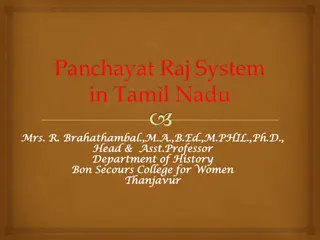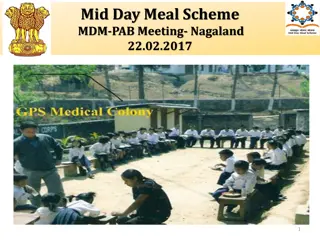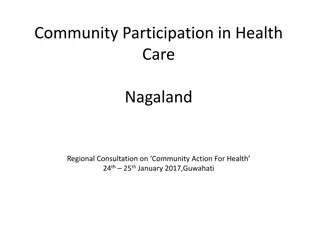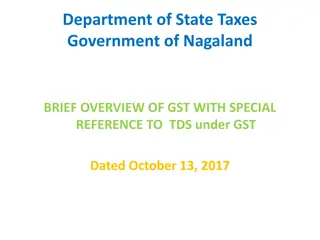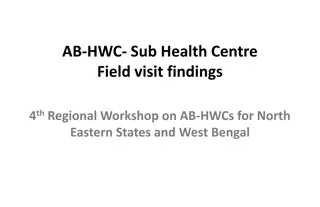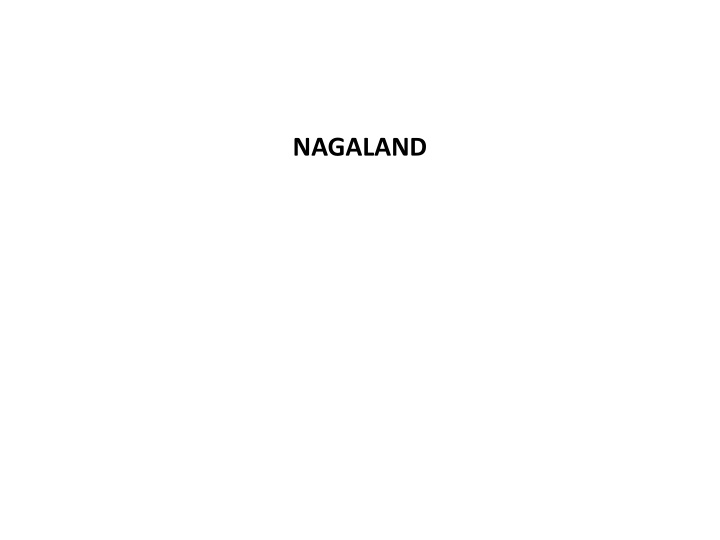
Healthcare Situation in Nagaland: Issues, Practices, and Recommendations
Explore the healthcare landscape in Nagaland, highlighting good practices such as community empowerment and major issues like high out-of-pocket expenses. Recommendations include prioritizing funds, generic drug procurement, and enhancing training programs for frontline workers.
Download Presentation

Please find below an Image/Link to download the presentation.
The content on the website is provided AS IS for your information and personal use only. It may not be sold, licensed, or shared on other websites without obtaining consent from the author. If you encounter any issues during the download, it is possible that the publisher has removed the file from their server.
You are allowed to download the files provided on this website for personal or commercial use, subject to the condition that they are used lawfully. All files are the property of their respective owners.
The content on the website is provided AS IS for your information and personal use only. It may not be sold, licensed, or shared on other websites without obtaining consent from the author.
E N D
Presentation Transcript
Good Practices 1. Enactment of The Nagaland Communitisation of Public Institutions and Service Act 2002 to enable empowerment of the community for effective delivery of various services including health services. 2. Infection Control Practices and Central Sterile Supply Department at DH Mon 3. Clean and well maintained facilities at all levels 4. Well functioning sub centre observed at ---- subcentre, Tuensang district in terms of cleanliness, skills of ANM and effective operational systems 5. Effective partnership between village council members and peripheral health workers and between health system and ASHAs
Major Issues 1. High Out-of-Pocket Expenses (including in JSSK). Ineffective and inefficient Drug Procurement and Supply Chain Management. Procurement by branded names 2. Quality of ANC and HBNC compromised-large no. of home deliveries, failure to capture high-risk pregnancies. 3. No Fully Functional FRU in any of the district visited mainly due to Irrational deployment of HR and equipment 4. Time to care approach not institutionalized. Poor road conditions and non-availability of assured public transport aggravates the situation
Major Issues 5. Lack of District specific RoPs and inadequate availability of funds at district level. 6. Fund Crunch: Inordinate delays in transfer of funds from Treasury to State Health Society. Centralized Planning.. 7. QA and Kayakalp: Slow progress on QA and Kayakalp. Poor compliance of new rules under BMW (Management and Handling) Rules, 2016. No Combined BMW Treatment Facility. 8. Quality of ANC/HBNC: Huge gap in Training and Capacity Building across all cadres. Minimal awareness on recently launched programs/trainings
Recommendations 1. Prioritize release of funds to State Health Mission from Treasury. Ensure formulation of district RoPs. 2. Establish an Autonomous Centralised procurement agency with E-tendering mechanisms. 3. Ensure procurement and prescription by generic names. 4. Prioritize developing a rational and implementable training plan for all frontline workers. Initiate multiskilling trainings for MOs. 5. Undertake 6 monthly State Review Mission of NHM. 6. Formulate a HR Policy and start work towards a public health cadre (including program management) with detailed plan for ensuring rationalized postings. 7. Establish a Common Biomedical Waste Treatment Facility.
Processes and actions initiated so far by the state as per CRM observation and suggestion
Processes and actions initiated so far Lack of District Specific RoPs: Exercises being carried out to develop district RoPs and allot fund as per approval and requirement ( district specific) High out of pocket expenses (including JSSK): The issue pertaining this is being tackled with supplementation of diagnostic equipments and services being provided. Viz. Cardiotocogram, portable ultrasound, foetal doppler, hysteroscope, vaccum extractor with silicon cup, labour table, infusion pump etc procured and disbursed recently (April 2017). Other diagnostics/lab equipments too on the pipeline for distribution to facilities (procured and verification already done) Quality of ANC and HBNC compromised-large no. of home deliveries, failure to capture high-risk pregnancies: with the above basic diagnostics and equipments in place as mentioned service delivery quality is expected to improve. Emphasis is being given in effective and timely report on RCH portals for data capture. Register for high risk pregnant woman has been proposed in PIP 2017-18 so that uniform tracking system would be in place. Mapping of high home delivery pockets and distribution of tab Misoprostol initiated. Training specific to service provider on various newer programe propose in PIP 2017-18 FRU Operationalization: Irrational deployment of HR and equipment: Exercises for rational deployment of HR and equipment (of all levels of facility) is being done and in process for finalization and approval with the directorate. HR policy documentation has been proposed in PIP 2017-18
Processes and actions initiated so far OOPE:. In addition; effective collaboration with NagalaIneffective and inefficient Drug Procurement and Supply Chain Management. Procurement by branded names: NHM free and generic drugs notification disseminated to all districts. In addition, effective colloboration with Nagaland Health Project (World Bank Funded) for streamlining the procurement and supply chain management system. Thirdly, Janasudhi (Generic Drugs) scheme has been launched by Hon. Minister for Health, Nagaland, today- 1stof June 2017) Time to care approach: Proposed for One district (Mokokchung) on pilot phase for the current year 2017-18 which gradually will be scaled up in the subsequent years. In addition, State has proposed for Health and wellness centers in four HPDs this year (2017-18 PIP) on pilot basis to be scale up in near future. QA and Kayakalp: Kayakalp scheme so far being implemented successfully as per guideline (2015-16 & 2016-17 awards given). With reference to QA Manpower at state and Five Districts already in place. Other districts on the pipeline for recruitment as per approval.



